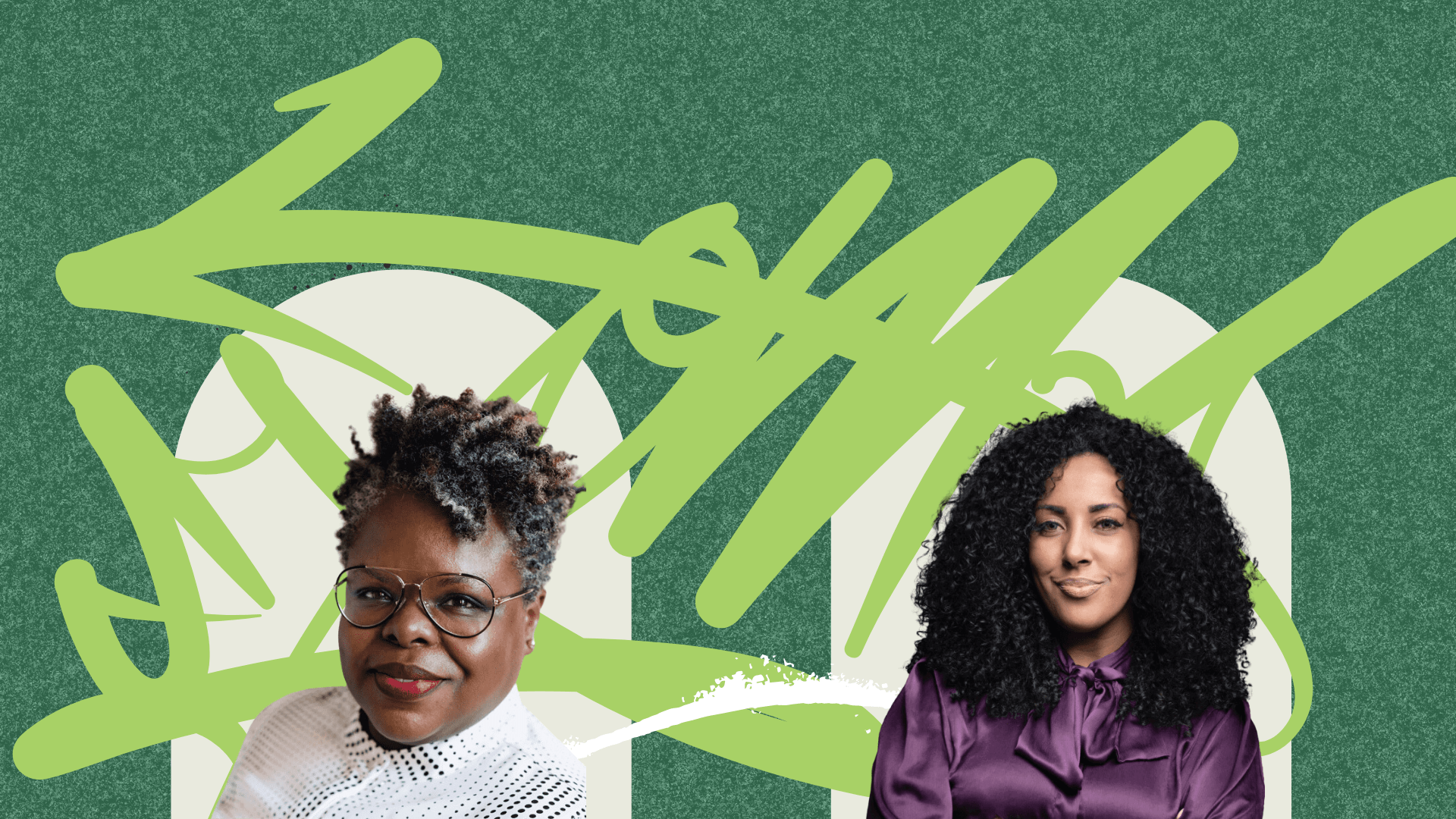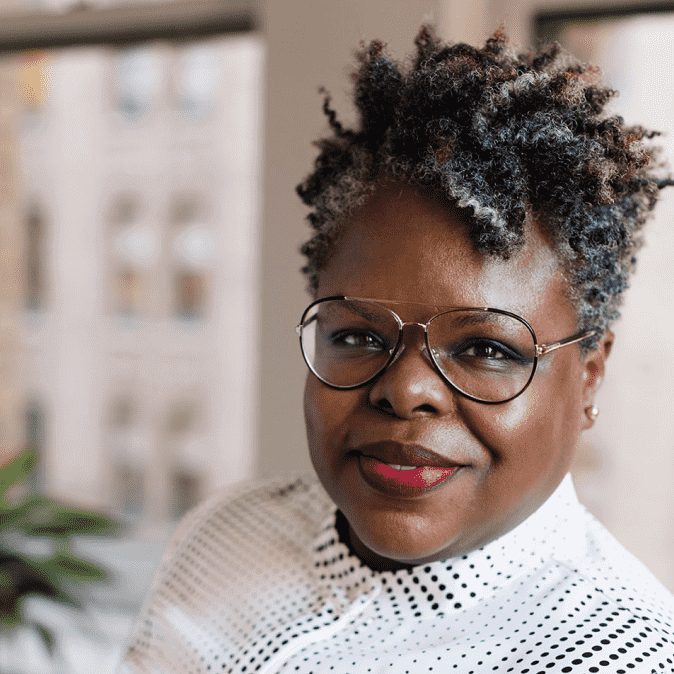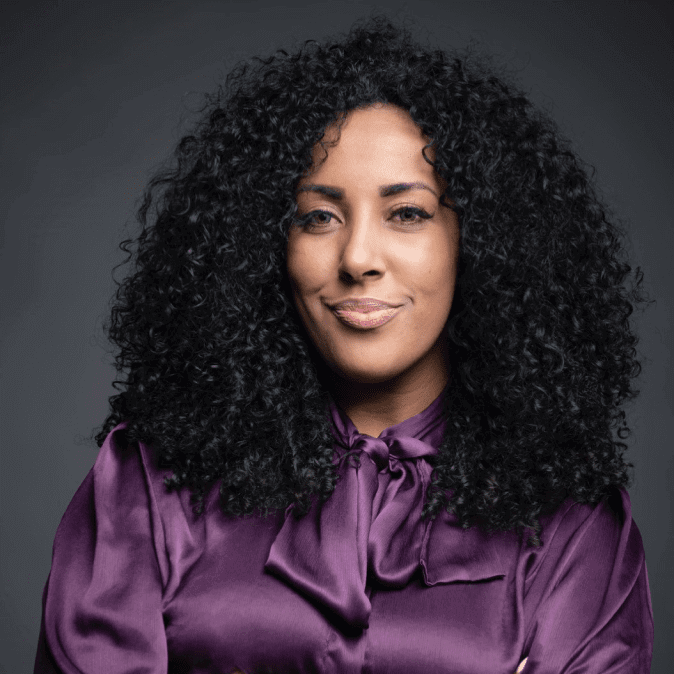
Makeeba Browne on bringing a global lens to climate justice and our evolving approach to prioritize the people and communities most impacted by climate change.
Our Justice, Equity, Diversity, and Inclusion team is committed to integrating justice and equity into ClimateWorks’ programs, services, and operations, as well as to supporting climate solutions that are equitable, inclusive, and just. Makeeba Browne, ClimateWorks’ Chief of Equity, Justice, and Culture, recently sat down with Mara Silverio, Senior Communications Associate, to discuss how we bring a global lens to climate justice and our approach to prioritizing the people and communities most impacted by climate change. This interview has been edited for length.
Mara: What’s most exciting for you about your role as Chief of Equity, Justice, and Culture at ClimateWorks?
Makeeba: This role deeply aligns with my passions and talents because it’s grounded in people. In terms of internal culture, our team looks at the systems, processes, and policies that can enable the organization to have an equitable approach to how we show up. We have the opportunity to take some of the best DEI frameworks and practices from various fields and apply them in the philanthropic space.
My team also works to see that ClimateWorks adopts just, equitable, diverse, and inclusive approaches to our grantmaking, audiences, data collection and distribution, reports and publications, and broader strategy development.
We want to establish that we are going beyond technocratic solutions to align with human-level impacts and work toward equitable outcomes in our recommendations and our grantmaking.
It’s a vast remit, and I’m passionate about prioritizing the benefits and the livelihoods of people. I get to do so through ClimateWorks — a wildly successful and privileged platform — and climate philanthropy writ large.
I’ve been in the climate space now for about 16 years. While I’m based in the United States, my work has been global, overseeing portfolios and setting up re-granting institutions in Brazil, Mexico, Indonesia, and India. So, while my work certainly brings in learnings and frameworks from an antiracist, justice lens rooted in the U.S., it also involves understanding root causes and addressing the impacts of systemic inequities in other countries. This approach is essential to my analysis and design. Ultimately, what’s most exciting is that across ClimateWorks, we’re expanding our networks and impact with people at the heart of what we do.
Mara: What opportunities are there right now to prioritize JEDI (justice, equity, diversity, and inclusion) in climate action?
We’re seeing that you can’t get anywhere without people power. The science is the science, but the deep, human interconnectedness that is required for climate action can get lost in analysis and modeling. The science won’t tell you about how people will respond to floods, fires, climate migration, and what social structures need to be reformed or completely overhauled to adapt to climate catastrophe, especially for Black people, Indigenous people, women, disabled folks, and other populations that have been historically marginalized by colonialism, extractive capitalism, and systemic oppression.
We need to prioritize the people and communities most impacted by climate change and solutions based on local knowledge. That is where the funding must go–that is how you build power and win. This requires shifting beyond a singular focus and toward approaches that improve livelihoods around the world. We also have to show up in a way that centers justice and prioritizes economic development and other intersectional approaches to social impact and climate action.
Mara: How has ClimateWorks’ approach to climate justice and equity evolved?
Makeeba: Over the years, we have broadened our approach and entered new regions in a way that respects local knowledge and priorities. We’ve also worked hard to identify and fund spaces that haven’t traditionally received the same levels of support. We see that mobilizing people power can lead to significant wins on climate action. We’ve gotten bolder with our experimentation and must continue to do so.
It’s also important to consider how we approach the work. Through initiatives like our JEDI Pilot Fund, we have and continue to lean heavily into a trust-based philanthropy framework. We are tapping into the organization’s collective knowledge, which means that everyone has something to contribute in terms of designing both internal and external solutions. The solutions are coming from multiple different channels and areas, since the climate fight belongs to all of us.
Mara: What are some of the key learnings for ClimateWorks in this work?
Makeeba: One ongoing learning opportunity for ClimateWorks involves testing, piloting, and assessing our approaches to confirm they align with our JEDI values. In our grantmaking and solutions design, we must always remember the key principles of not perpetuating harm by analyzing the root causes of systemic inequities.
This is a challenging endeavor because we are engaging with centuries of colonial infrastructure, including philanthropy itself. We must regularly question our own assumptions, which is not always easy to do in the face of urgency.
ClimateWorks also has an opportunity to help the philanthropy sector see climate change as a human rights issue — and that ignoring the root causes of the crisis will exacerbate a broader range of human and environmental injustices.
As we think about the path to 2030, our challenge is around how to reframe from a purely carbon perspective and shift toward a human rights perspective, focusing on those who are being impacted now and who deserve the right to self-determination.
Mara: What kind of progress would you like to see this year?
Makeeba: We’re piloting an internal embedded coaching approach called the Higher Ground Accelerator, to help ClimateWorks’ programs progress further along on their individual JEDI journeys. This effort will facilitate in-depth engagement around JEDI issues on a sector-by-sector and program-by-program basis, focusing on the counties where we work.
2024 also marks the fourth year of ClimateWorks’ JEDI Pilot Fund, with another $4 million of committed funding to facilitate the implementation of just and equitable approaches in our grantmaking. The Fund will continue to support movement-building; shift the narratives, build capacity and deepen JEDI integration across our internal operating processes, policies, and systems; and develop and prioritize partnerships with organizations and actors focused on just and equitable climate solutions. As in previous years, our focus remains on organizations in the geopolitical South.
Last, but not least, we want to do more to advance our learning journey. We plan to share more openly what has and hasn’t been working in terms of our broader agenda, including successes, areas for improvement, and pivots as we strive to embed JEDI into all that we do. Openness and transparency with our implementing partners and funders are essential to ensuring that we’re moving in the right direction.
Mara: What advice do you have for the philanthropy ecosystem?
Makeeba: I encourage funders to take risks on organizations that they haven’t engaged with before. There is data available about who’s getting the bulk of the funding and who is underfunded. Aligning investments and grant dollars to go directly to communities would be an incredible start in terms of resourcing and building capacity for people to take action and resourcing movements to do great work. Funders should also lean into intersectional approaches and think more expansively about climate change, recognizing its profound impacts on human well-being, including areas such as health, education, food and energy access, and local economies.
Philanthropy must also recognize that we’re building against the continuum of systemic oppression that has existed for centuries. General operating multi-year grants help organizations plan and drive greater impact over the long-term. For the broader ecosystem, it’s about staying connected. There’s a lot of opportunity to collaborate across organizations and coordinate efforts to generate the most impact.
Mara: On a personal level, what gives you hope and how do you stay energized when it comes to working on climate?
Makeeba: We’ve seen a lot of energy and momentum from young people who are deeply aware and politicized about global issues and climate change. They are insisting on a new way of being. So, I get a lot of hope from young people not only because they hold the future, but because there’s a high demand for change.
I’m also hopeful when I see different voices taking center stage. Over my career, I’ve seen a shift from conversations dominated by white men with power and privilege to those that include women, people of color, individuals from the global majority, LGBTQ+ people, young people, and those with varying abilities. When you have these different voices, you are going to have a different way of designing and thinking about the future.


